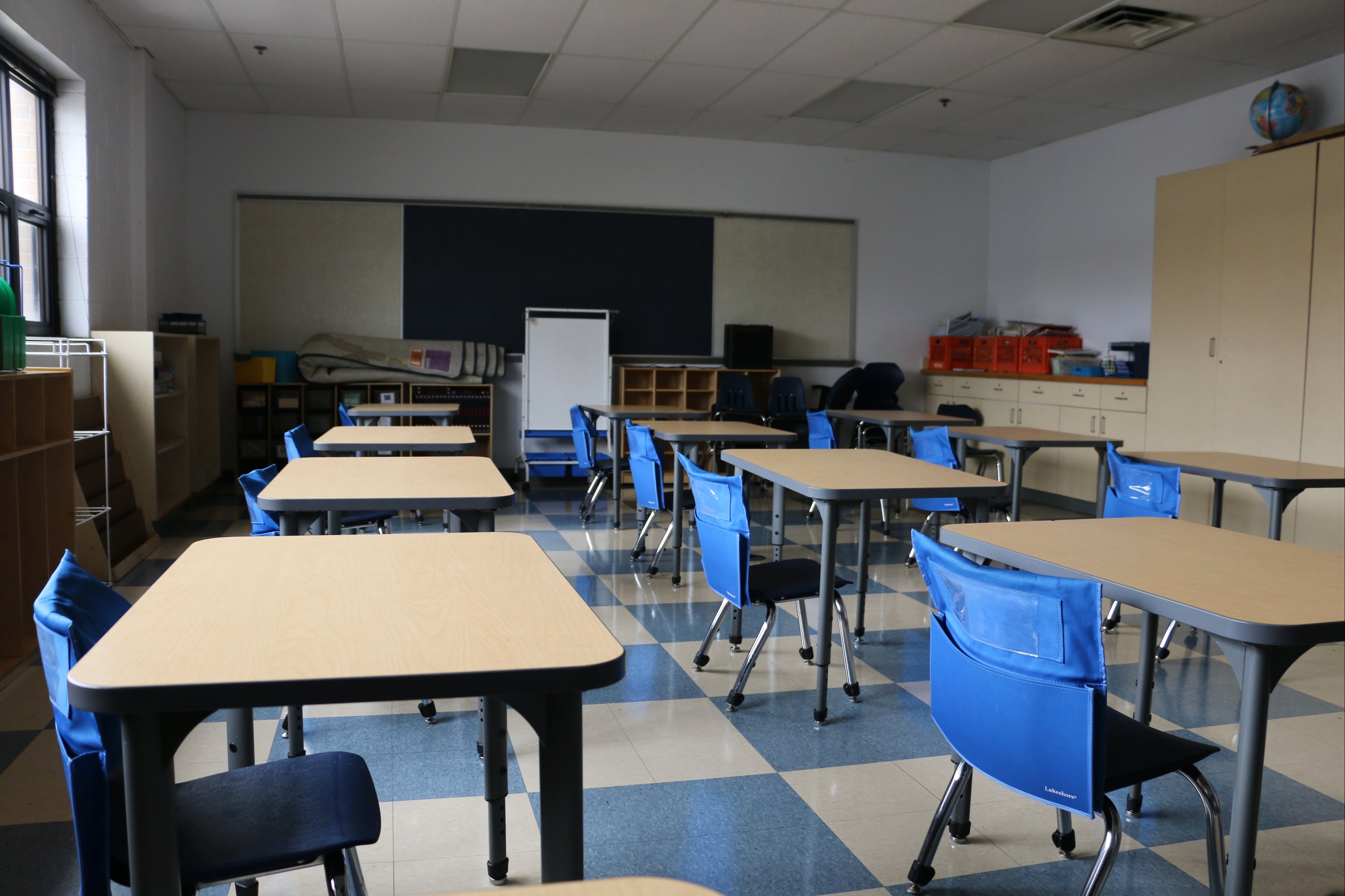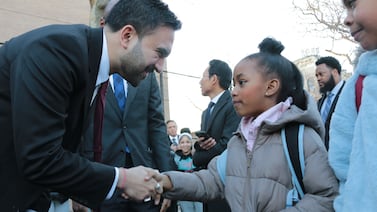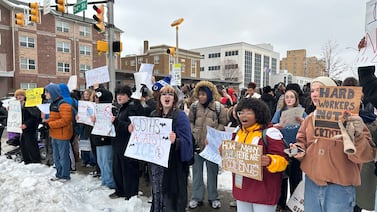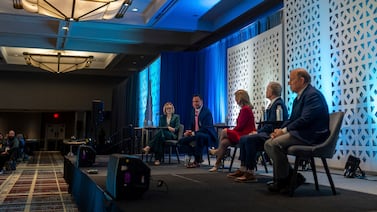The recent state closure of University Heights Charter School, a network of three Newark schools that enrolled about 600 students, upended short- and long-term plans for hundreds of families.
Now, it’s costing them.
Closing the school shortly after the end of another unprecedented school year has led to unforeseen financial burdens, parents said. Unbudgeted expenses, like summer camp and new school uniforms, are quickly adding up.
And midway through summer break, some anxious parents still don’t know where their children will go to school in the fall.
“There was no regard for parents or children,” said Tanysha Flood, a parent of a rising third grader who had attended University Heights since kindergarten. “The timing of this was inconsiderate and it could be detrimental to my child.”
While school closures often occur because of poor academic performance and under-enrollment, research has shown they can be emotionally disruptive for students. A 2018 study noted that some students have faced “lasting negative impacts on socio-emotional health and long-term declines in academic performance.”
The state Department of Education revoked University Heights’ charter June 30. It informed the pre-K-8 network of its decision in a letter dated June 1.
The school, which has been on probation since 2019, struggled to improve students’ academic performance, faced declining enrollment, and had an unstable leadership team. All those factors contributed to its closure, acting Education Commissioner Angelica Allen-McMillan said in the letter.
Even so, parents say, the decision was ill-timed.
Open enrollment for district schools closed in February. Students received notice of their placements in April. And registration for Newark Public Schools’ free summer program ended in May.
Although the district reopened the enrollment window for families of University Heights students, parents say they’re finding their preferred choices are already at capacity for the 2022-23 school year.
With just weeks to go before the start of school, their students are getting waitlisted, they said.
“Our students already experienced so much trauma during the pandemic,” said Christy Oliver-Hawley, who became head of schools at University Heights in August 2020. “Ninety-five percent receive free lunch and have challenges at home. Now, they have yet another life-altering experience they’re forced to go through.”
About 400 families who signed up for University Heights’ free summer enrichment program also had to suddenly seek alternative plans and, in some cases, face late registration fees they weren’t prepared to pay.
“Now I’m scrambling to try to pay a few hundred dollars for something I thought my children were going to get for free this summer,” said Ashley Goins, a parent of two children who had attended University Heights since preschool. Goins sat on the network’s board of trustees as a parent representative this past year.
Goins will also have to pay for new school uniforms, but can’t buy them just yet for one of her children since she is on a waitlist. “School starts in a few weeks and I still have to get uniforms, and the closer to school starting, the more expensive they get,” she said. “I’m very anxious and frustrated.”
Declining enrollment, low test scores, instability
Though families and school officials say the state’s decision felt abrupt, it was years in the making.
When the state put the school on probation in May 2019, the sanction required the network to make drastic improvements to address exceptionally low test scores and chaotic classroom environments.
In 2019, the school’s state test scores fell to the bottom 5% of high-poverty schools in the state. And classrooms “were not conducive to student achievement” due to unsafe, disruptive student behavior, “with limited evidence of staff intervention,” Allen-McMillan said of the state’s observations of the school from three years ago.
School officials say progress was ongoing, but more time was needed to see the fruits of those changes.
“It’s been a Herculean task to turn this around and get us on the right path,” Oliver-Hawley said. “Our goal was to move from probationary status to a National Blue Ribbon School, and I believe we could’ve gotten there.”
Under Oliver-Hawley’s leadership, the charter school conducted an audit to ensure every teacher was certified and qualified to teach, and hired school counselors, attendance officers, and a parent coordinator. The charter also implemented a one-to-one Chromebook program and free tutoring programs before and after school, she said.
But state education department officials determined the progress so far has not been enough, and more red flags cropped up after a site visit this past spring.
Though class sizes were smaller and behavior was “less disruptive” during an unannounced visit by the state on March 14, officials observed “low-level” instruction and student engagement, Allen-McMillan said.
“However, the maximum number of students in each observed classroom was 12, which may have minimized potential disruptive behaviors with considerably smaller class sizes than previously observed,” she added.
That number, in turn, raised questions about the school’s enrollment.
The charter network’s enrollment dropped to 566 students last school year, compared to 742 during 2020-21. The school has a maximum approved enrollment of 1,005 students, but only enrolls 56% of that limit, department officials said.
And concerns about enrollment are related to another problem: the network’s troubled finances.
University Heights faced the threat of foreclosure or a management takeover earlier this year after it defaulted on the terms of a $14.72 million loan agreement. The charter network used that loan to purchase and renovate a building for its elementary school.
UMB Bank, which represents the bondholders, noted the school’s declining enrollment was cause for alarm and threatened its ability to repay its debt. However, Allen-McMillan did not raise that issue in the state’s letter.
During the state’s site visit in March, education department officials also observed students with individual education plans, known as IEPs. Those students, Allen-McMillan wrote in the letter, received instruction “in a small room that was not conducive to learning.”
Further, a properly certified staff member was not delivering instruction and services, “revealing additional non-compliance” with state special education statutes and codes, she said.
The education department also evaluated the charter network’s assessment scores when deciding whether to shut down University Heights.
Since 2019-20 and 2020-21 statewide assessments were canceled, the state reviewed the school’s benchmark assessments from 2020-21, which showed marginal growth, Allen-McMillan said.
“Absent systemic academic growth suggests University Heights lacks the organizational capacity to provide high-quality education,” she said.
Additionally, the state noted the charter has had two executive directors and three school business administrators since February 2020. The school also hired three new principals in 2020-21, but one of them was set to retire this year. Constant changes in leadership roles “has failed to correct organizational instability,” the state said.
‘Blindsided’ by the state’s decision
University Heights has appealed the state’s decision in Superior Court of New Jersey. The school, which is represented by the Johnston Law Firm of Montclair, argues that the timing of the closure “irreparably harmed students who experienced undeniable COVID-19 related learning loss and trauma,” and violated workers’ rights to fair notice of an employer’s closure.
As for the timing of the charter’s revocation, state regulations allow the education commissioner to revoke a school’s charter “at any time” following a review by the department, said Laura Fredrick, the department’s communications director, in an email.
Oliver-Hawley said the school held a job fair for teachers and staff before shutting its doors for good last month.
“We were blindsided,” she said, adding that state officials gave her positive oral feedback after the site visit in March. “We’re still experiencing that sense of shock.”
While Goins awaits for her daughter’s name to move off a school waitlist, she’s concerned about students who might be discouraged because of all the uncertainty.
“I think a lot of students are just not going to start right away because they don’t know where they’re going next,” Goins said.
Catherine Carrera is the bureau chief for Chalkbeat Newark, covering the city’s K-12 schools with a focus on English language learners. Contact Catherine at ccarrera@chalkbeat.org.






